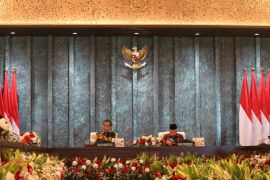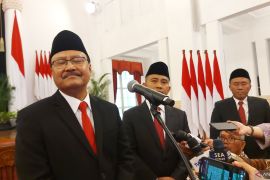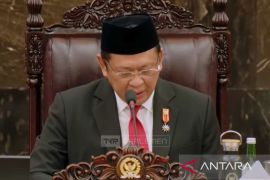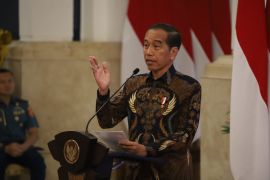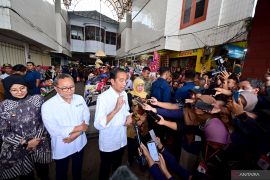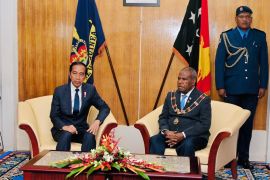By Otniel Tamindael Jakarta (Antara) - The government of President Joko Widodo, better known as Jokowi, is adopting a more serious approach to crackdown on corruption crimes and heighten its corruption eradication efforts in Indonesia. Corruption eradication efforts will continue to be strengthened by building synergy among law enforcement institutions and other related departments. \"Law enforcement agencies should take serious action against the perpetrators of corruption crimes without pursuing their respective popularity,\" President Jokowi remarked during the signing of a memorandum of understanding on joint action for saving natural resources at the State Palace here on Thursday. The memorandum of understanding was signed jointly by all ministries and institutions and the leaders of the Corruption Eradication Commission (KPK), the National Policy (Polri), the National Defense Forces (TNI), and the Attorney General\'s Office. On the occasion, President Jokowi stated that the steps to prevent and crackdown on corruption crimes should be implemented properly and should not simply be ceremonial. \"Prevention of corruption without firm action against the perpetrators will not set the right precedent,\" President Jokowi remarked. The head of state then called on all parties to gain a common understanding regarding the prevention of corruption and action against corruption crimes. He affirmed that every law enforcement agency should coordinate with its corruption eradication partner to end corruption and to prevent institutional ego. \"We need to build synergy between law enforcement institutions, so that corruption can be eliminated completely,\" the president noted. The sternest possible action will be taken against the perpetrators of corruption crimes, and thus, the KPK Acting Deputy Chairman Johan Budi has stated that the punishment awarded to them was not similar to that given to a chicken thief. \"Because corruption is an \'extraordinary crime\', so its eradication efforts should be tightened, and the punishment granted to the perpetrators should not be compared to that given to a chicken thief,\" Johan noted in a short message here on Wednesday. He made the statement regarding Law and Human Rights Minister Yasona Laoly\'s plan to revise Government Regulation No.99/2012 on remission and parole for those convicted of corruption, drugs, terrorism, serious crimes, and transnational organized crimes. Yasona recently stated that he planned to revise the regulation, and his plan includes the extension of remission to prisoners convicted of corruption under the authority of his ministry. According to Regulation No.99/2012, prisoners involved in corruption, narcotics, and terrorism are not entitled to remission. Noting the clear discrimination in granting remission to these prisoners, Laoly has urged that no other institution should be involved in granting remission. \"Remission should be granted fairly as it is one of the rights of prisoners,\" he remarked. Moreover, the idea has drawn a lot of flak from several anti-corruption advocates. Chief of the Setara Institute Hendardi emphasized that although prisoners have the right to remission, the government must not easily extend remission to corruption prisoners as it would hurt the sense of justice of the community. \"Remission and parole should not be granted easily. The right must only be given based on high accountability to ensure that they do not harm the society,\" Hendardi cautioned. Furthermore, the Anti-Corruption Study Center of the state University of Gadjah Mada in Yogyakarta also urged the government to not easily grant remission to corruption convicts. \"If conditions (to be eligible for remission) are relaxed, it is feared that the sentence would not serve as a deterrent,\" Zainal Arifin Mochtar, director of the center, affirmed. He accused the justice minister of failing to understand the essence of the government\'s regulation, referring to his idea to revise Law No.99/2012 to give remission and parole to corruption prisoners. \"The justice minister has failed to understand the true meaning of the government regulation because it does not violate any rights of the prisoners,\" Mochtar stressed. He expressed hope that the government would not easily extend remission to corruption prisoners, but would, instead, tighten requirements that make them eligible for it. \"If the requirements are too flexible, the sentence will not have a deterrent effect on corruption convicts, and the commitment of President Joko Widodo towards eradicating corruption could be questioned,\" he stated. In response to the public debate over corruption convicts being granted remission, Vice President Jusuf Kalla stated that the remission was part of the punishment itself. \"Corruption prisoners are eligible for remission. If corruption is considered a serious crime, the sentence levied for it must be harsh. However, remission is part of the sentence itself,\" the vice president explained. He remarked that those who were convicted and served time in jail must have followed the rules in place. \"The corruption convicts who are in jail have, certainly, served their sentences and followed the regulations in place, making their status equal to those of other prisoners,\" Kalla pointed out. (*)
Jokowi Government Serious about Handling Corruption Crimes
Jumat, 20 Maret 2015 15:39 WIB



